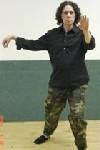MANHATTAN, New York (August 18, 2008)
"When the flesh meets the cross…Seduced by evil desires…" Admonitions and warnings of a sermon open the episode of ‘Three Sundays.’ How do we learn right and wrong? We can hear the encouragement to behave properly and the threat of punishment for immoral actions but we learn by empathetical observation of those in positions of standing. Witnessing actions of our parents and societal role models teach us what will be rewarded and what will be negatively reinforced or punished. At the extreme, the Catholic church of Peggy offers heaven and warns of hell.
DISCLAIMER: The essay below contains plot spoilers about Season 2, Episode 4: "Three Sundays." If you haven't seen that episode, check out the Mad Men schedule on amctv.com to see when encore presentations are airing or download it from iTunes.
The Drapers engage in a domestic drama regarding how to control and discipline their son Bobby. He is full of “shenanigans, ...being wild in the house, ...lying in (Betty's) face” and ignoring warnings to be careful. Betty wants Don to deliver Bobby a spanking to teach him. Betty snarls the point, "First the washing machine and now the hi-fi... How else is he going to learn the difference between right and wrong?"
It is interesting to note that Betty has started to neglect the understood motherly function of feeding her kids (at 7:30 PM) and her husband when he returns from work. Betty at the end learns from Don: "My father beat the hell out of me. All it did was make me fantasize about the day I could murder him." Their couple violence escalates to shoves and threats to bodily harm (as in "put you through that window").
Daughter Sally is about eight years old and precociously knows enough to ask Paul about sex when she visits the office. “Do you kiss her? Do you ride on top of her?” Discussions with Joan about breast size and expectations of her own image of what she will be when she grows up are Sally's way of being sophisticated and “hip” (not yet a verbal meme for eight-year-olds in 1962). As we know, the tweeners and younger girls of today are bombarded with provocative and suggestive images and sounds. Some will not be so fortunate as to be carried home in the arms of their fathers after their first experiment with drinking whiskey until they pass out. It is worth noting for concerned parents that about 20% of children (even as young as six) are interested in sex, know the basics and fantasize about its adult implications (from the perspective and dream worlds of children, of course).
On the other hand, Roger Sterling has learned that he can get anything he wants if he is willing to pay the price of the ticket or “invoice” as he puts it. Vicky the prostitute has agreed to Roger’s price point in exchange for Roger getting whatever he wants in sexual acts. They depart from the hotel room to Lutece with Roger volunteering to school her in the finer points of red wine (and perhaps how to be his perfect mistress).
Father Gill learns from sister Anita Olson during confession that Peggy has “seduced a married man.” Anita judges her and hates her for her sin of the out-of-wedlock child. What's more, Anita feels that Peggy “acts like nothing has happened.”
Peggy's story resonates for us all. My own personal footnote is that I was conceived out of wedlock in murky circumstances during an evening of a summer baseball tournament. The act of conception was in a car with alcohol involved. This was an era when abortion was out of the question. Our nuclear family had a “wild-man” electron from before day one. “Growing up with the teenagers” was literal, figurative and painful. My familial (not the biological) father suffered and withdrew from me at a very early age.
Father Gill commits an act of tender kindness when he gives Peggy the blue Easter egg “for the little one.” May we all learn compassionate wisdom. ///
Monday, August 18, 2008
'Three Sundays' Teach Mad Men Right & Wrong
Subscribe to:
Post Comments (Atom)

No comments:
Post a Comment